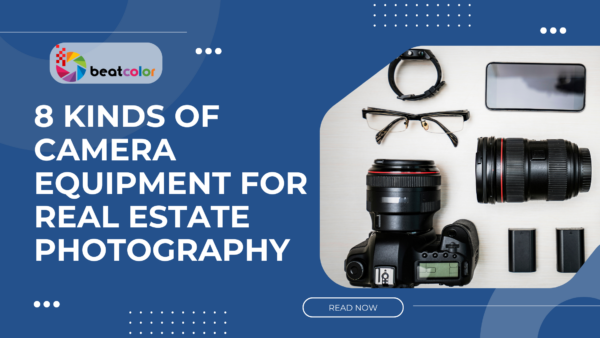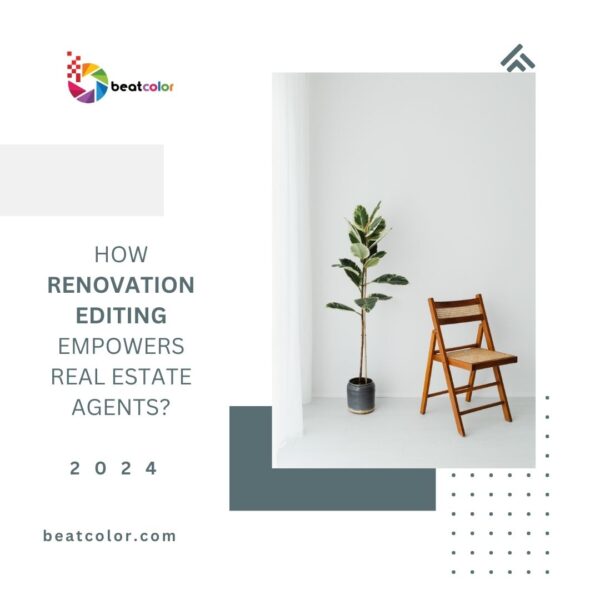Is Real Estate AI-Powered Photo Editing Too Good To Be True?
In the 4IR, real estate AI-powered photo editing has significantly revolutionized the way photographers enhance their images. These cutting-edge technology can automatically adjust exposure, color balance, and other setting, resulting in studying and polished photographs. By leveraging AI in real estate photo editing, photographers can reach new heights, allowing real estate professionals to present properties appealingly and professionally.
However, while AI-powered photo editing offers many benefits, it’s important to consider its potential drawbacks and how to use it effectively and ethically in real estate.
Benefits of Using Real Estate AI-Powered Photo Editing
Embracing AI promises considerable benefits for businesses and economies through its contributions to productivity growth and innovation. At the same time, AI-powered photo editing’s impact on work is likely to be profound.
Consistency:
AI editing ensures a uniform appearance across all photos in a listing, creating a professional presentation and enhancing the overall perception of the listing. By presenting a cohesive visual narrative, the listing can stand out in a crowded marketplace, drawing more interest and helping potential buyers or clients form a positive first impression. This consistency can help attract more attention from prospective buyers, as the uniform look conveys a sense of care and attention to detail.
What’s more, AI can adjust photos for optimal lighting and composition, ensuring that each image highlights the best property features. This can lead to higher engagement and potentially faster sales or conversions, as viewers are presented with a polished and aesthetically pleasing visual experience.
Time-Efficient:
Editing real estate photos manually can be time-consuming while AI will speed up the process by automatically enhancing images. By delegating photo editing to AI tools, agents can streamline their workflows and allocate more time to revenue-generating activities.
AI’s ability to handle repetitive tasks such as adjusting brightness, cropping, and retouching ensures a consistent standard across all listings without compromising quality. This not only saves time but also improves productivity, enabling agents to manage more listings and serve more clients effectively. With the support of AI, real estate agents can streamline their workflows and allocate more time to revenue-generating activities. Thanks to that, they can stay ahead in a competitive market and provide better service to their clients, ultimately driving business growth and success
Staging Enhancements:
AI can digitally stage rooms, allowing buyers to envision a property’s potential without physical staging. This is especially useful for vacant or under-furnished properties. By virtually furnishing rooms with stylish and modern decor, AI helps buyers visualize how spaces can be utilized and personalized to their tastes.
Digital staging not only enhances the appeal of a listing but also reduces the time and cost associated with traditional staging methods. This approach can lead to quicker sales as buyers gain a clearer sense of the property’s potential, helping them make more informed decisions. Additionally, AI’s capability to easily update and change virtual staging in response to buyer preferences can further personalize the viewing experience, making properties more attractive and marketable.
Potential Misrepresentation of Using Real Estate AI-Powered Photo Editing
Alongside AI’s positive impacts on real estate photo editing progress, the potential challenges to adoption, include unintended consequences and overuse. Key challenges to be addressed include:
Risk of Misrepresentation:
Over-editing can make a property appear significantly different from its actual condition, leading to potential disappointment and loss of trust among buyers. This can result in negative feedback and potentially harm the reputation of both the agent and the seller. When buyers feel misled by photos, they may be less likely to engage with the agent or recommend them to others.
To mitigate this risk, agents need to strike a balance between enhancing images for visual appeal and maintaining the integrity of the property’s true appearance. Transparency and clear communication about any photo enhancements can help manage buyer expectations.
Ultimately, the goal should be to present the property in the best possible light while still accurately representing its current state. By doing so, agents can foster positive relationships with buyers, leading to smoother transactions and increased customer satisfaction.
Ethical and Legal Concerns:
Transparency and honesty are vital in real estate. Misleading images generated through real estate AI-powered photo editing could raise ethical concerns but also pose potential legal ramifications within the realm of real estate. Transparency and honesty are fundamental principles in the industry, crucial for building trust between buyers, sellers, and agents. When AI algorithms alter images to enhance or conceal certain aspects of a property, they risk misrepresenting the actual condition or appearance of the space. This deception could lead to dissatisfaction among buyers who discover discrepancies between the advertised images and the reality of the property upon viewing it in person.

Furthermore, in jurisdictions where real estate advertising is subject to strict regulations, using AI editing to manipulate images might constitute false advertising or deceptive practices, thereby exposing agents or sellers to legal liabilities and financial penalties. Courts may interpret such actions as a breach of consumer protection laws aimed at ensuring fairness and transparency in commercial transactions.
Overuse Issue
Overdependence on technology in the form of AI editing tools may inadvertently lead to the neglect of traditional photography skills within the real estate industry. While AI algorithms offer convenience and efficiency, they must maintain the creative eye and expertise of a skilled photographer. Traditional photography techniques involve more than just capturing images; they encompass an understanding of composition, lighting, and perspective, all of which contribute to creating authentic and compelling representations of properties.
When real estate professionals rely solely on AI editing to enhance images, they risk overlooking the nuances that can only be captured through human perception and craftsmanship. AI algorithms may prioritize certain aesthetic enhancements or corrections based on predefined parameters, potentially sacrificing the authenticity and character of the property in the process. In contrast, photographers possess the ability to adapt their approach based on the unique features and ambiance of each location, ensuring that the resulting images accurately reflect the essence of the property.
Moreover, over-reliance on AI technology may limit creative expression and innovation within the field of real estate photography. Instead of leveraging AI as a supplementary tool to enhance their skills, photographers may become complacent and reliant on automated solutions, stifling their ability to innovate and evolve in their craft.
The Need for Pre-Edited Photos
Another significant challenge with these AI tools is the need for pre-edited and retouched photos. To get the best results, users need to upload already-edited photos. If this is not done, the parts of the photo that need to be retouched and edited may remain in the new AI-generated images. This adds an extra step in the process and can be time-consuming, especially for users needing to gain photo editing skills or access to professional photo editing services.
These challenges highlight the current limitations of AI in real estate photography. While these tools offer potential benefits, they also underscore the need for further development and refinement to meet the needs of real estate professionals truly.
5 Principles for Effective Use of AI-Powered Photo Editing in Real Estate
Like any transformative trend, the rise of artificial intelligence (AI) poses both major opportunities and significant challenges. The most important thing is how to leverage AI-powered photo editing effectively and ethically. Below are some suggestions:
- Use AI as a Complementary Tool: Combine AI editing with traditional photography to strike a balance between enhanced visuals and authentic representation.
- Be Transparent: Disclose when AI enhancements have been applied to photos, fostering trust and setting clear expectations with potential buyers.
- Set Realistic Expectations: Ensure AI-enhanced images accurately represent the property’s true condition to avoid misleading potential buyers.
- Stay Updated: Stay informed about the latest AI tools and techniques to use them responsibly and stay ahead in the market.
- Collaborate with Professionals: Work with skilled photographers who understand AI editing tools and can achieve optimal results while maintaining authenticity.
Final Thoughts:
Real estate AI-powered photo editing has transformed the real estate industry, offering an innovative way to present properties in the best possible light. By providing enhanced visuals, efficiency, and customizable options, AI-driven editing tools can significantly boost marketing efforts. However, it’s crucial to use AI responsibly and ethically to maintain trust and authenticity. By combining AI with traditional photography techniques and working with experienced professionals, real estate agents can leverage the benefits of AI while safeguarding transparency and honesty in their listings. Ultimately, a balanced approach ensures that AI-powered photo editing is a valuable asset rather than a deceptive tactic, benefiting both agents and buyers alike.











